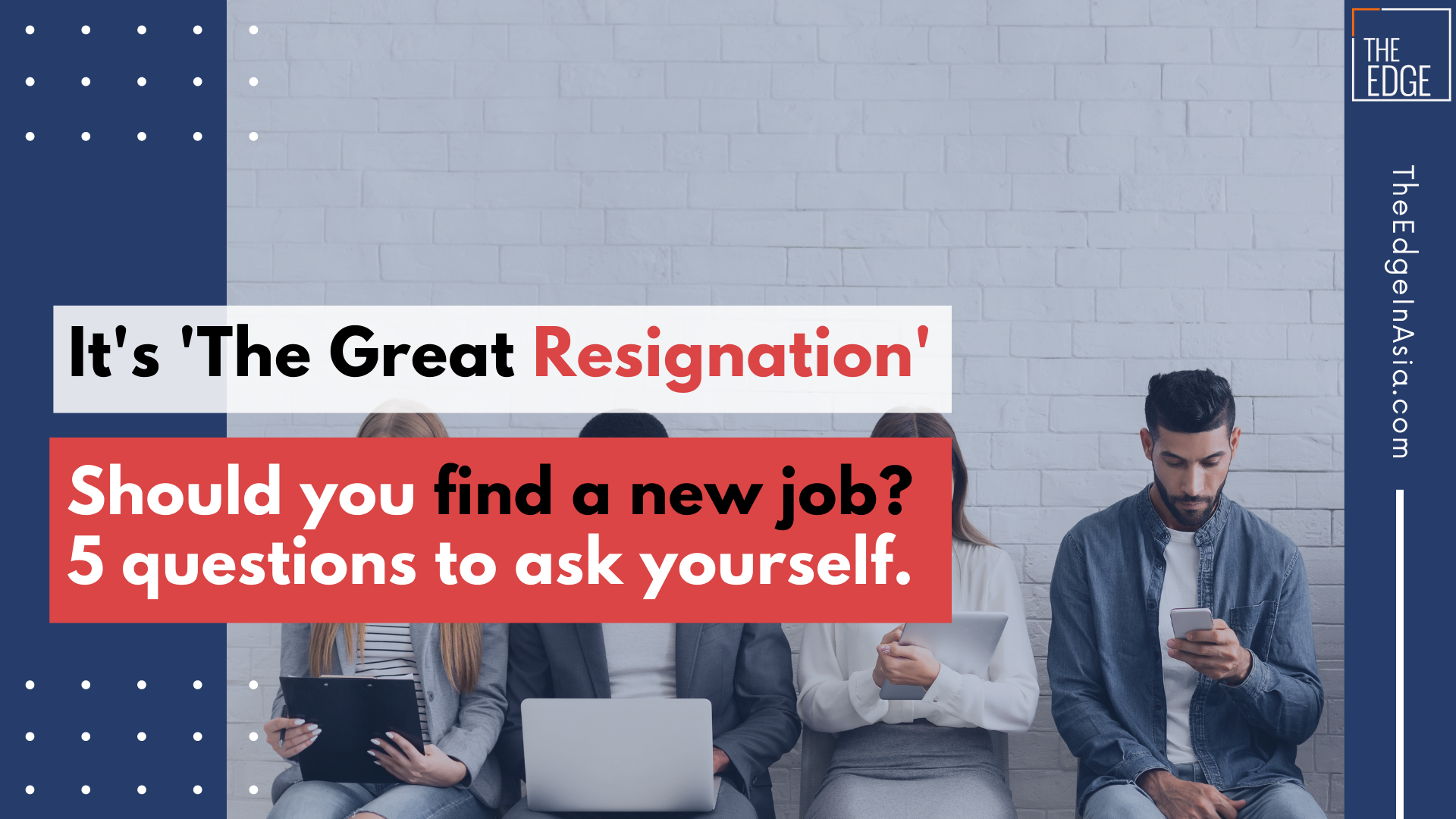
It’s ‘The Great Resignation’ – Should You Find A New Job? 5 Questions To Ask Yourself.
August 2021

August 2021
Quitting has been a regular keyword in recent headlines as most people are starting to imagine a post-pandemic future. Dubbed as “the great resignation”, “the great reshuffle” or “the talent tsunami” – people are looking for a change as the economy recovers and new opportunities arise.
More than half (54%) of employees surveyed from around the world would consider leaving their job post-COVID-19 pandemic if they are not afforded some form of flexibility in where and when they work, according to the EY 2021 Work Reimagined Employee Survey.
Before the pandemic, the top factors typically driving employees away were compensation and benefits, job security and growth opportunities. While these factors have not changed much, employee expectations of CEOs and companies have altered due to delayed job switches and a renewed sense of work-life balance.
If you are thinking of switching your jobs but unsure if it is the right move for you, here are five questions to ask yourself to help you bring clarity to your future job search.
Perhaps it was the pandemic that has changed your long-term goals or shifted your focus. With the future still uncertain, it could be that your desire to quit is rooted in wanting to exercise some control over your life or feel as if you are making progress.
COVID may have made you realise that you don’t want to postpone taking action on your dreams any longer. Or perhaps you want to stay in your field, but you need a new challenge or a new position.
It is time to think about your big goals, and then assess the current job market: Is your current job getting you where you want to go? If not, it’s time to take the first step toward something new that will help you move in the right direction.
If you have been with a company for more than a year, it will be good to reassess the changes made to your company.
Have they restructured your team or shifted responsibilities around? Were you assigned to take on a challenging task or was it passed on to someone else? Did they pivot strategies in a way that affects your day-to-day work?
Take a look at the way your job is structured right now and ask yourself: Am I happier than I was before? Are these changes making my job better? Or do I dread going to work or feel dissatisfied or frustrated by these adjustments?
Once you’ve determined how you feel, underline how do they affect you: Are those changes permanent? If the current setup does not bode well with your vision, exploring other opportunities may be worth it.
Expectations have generally moved beyond work to centre on the balance between work, life and purpose.
A Microsoft Work Trend Survey published in May found that 55% of respondents indicated feeling overworked whereas 39% felt exhausted. Mental and emotional well-being are now one of the most important topics in many companies
Figure out what setup would work best for you, whether that’s remote, on-site, or a hybrid of the two and find out what your company has planned. If there’s a gap between your goal and theirs that they won’t bridge, it may be time to look for another option.
Quitting because you have scored a great new job is the most ideal situation. Quitting with no backup plan is a last resort especially if your work is having a serious adverse effect on your mental health or physical well-being.
Changing career warrants more time: at least a buffer period of up to 6 months. Before giving in your notice or sending that official resignation letter, chart up a plan.
Firstly, ask yourself what do you want from a new job: a higher salary, a clear path to promotion, more management experience? Then start searching for open roles, connect with recruiters, polish and tailor your resume and get ready for your interviews.
If you’re in a high-demand field and recruiters are reaching out to you with job offers, you don’t need a new position lined up before you leave as you would have at least a couple of interviews scheduled.
In contrast to pre-pandemic levels, the job market remains highly uncertain. It could take as long as six months to find a new job.
Some candidates with multiple offers tend to be more confident to challenge offers they receive, backed by other offers and counteroffers. However, some would need more time to take it step by step.
If your ultimate goal is to start a new job, you could begin by filling in gaps in your skillset, find a recruiter and build your savings.
It is never truly the right time, and the perfect time depends on challenges and successes which can vary per industry, location, business sizes, competitive landscapes and talent requirements.
If you are looking to keep your options open and connect with recruiters to see what roles are available, feel free to reach out to us or browse our international database of jobs.